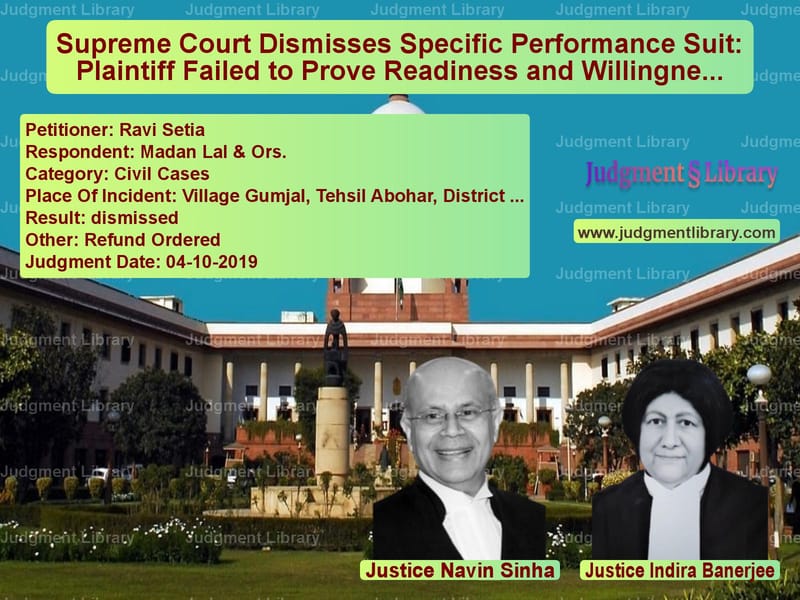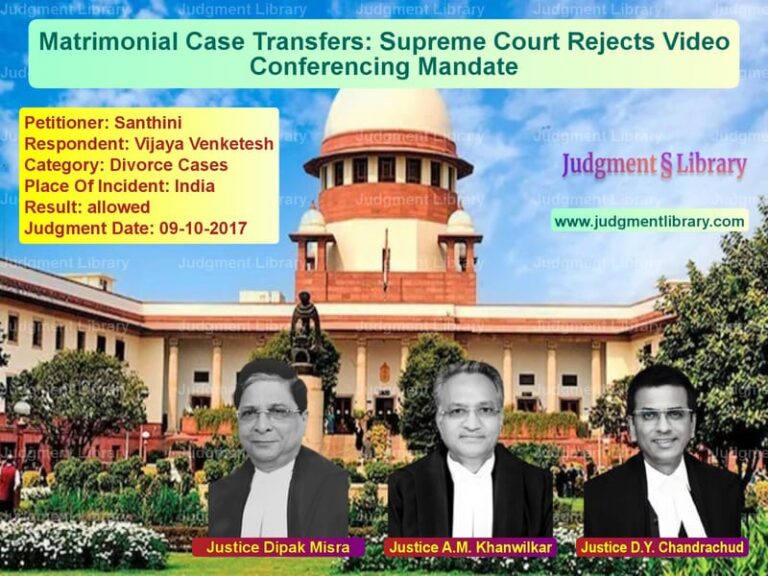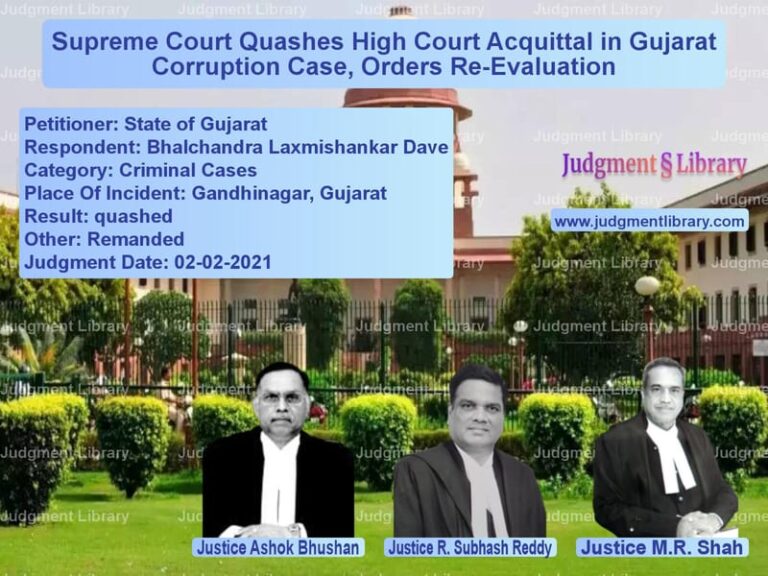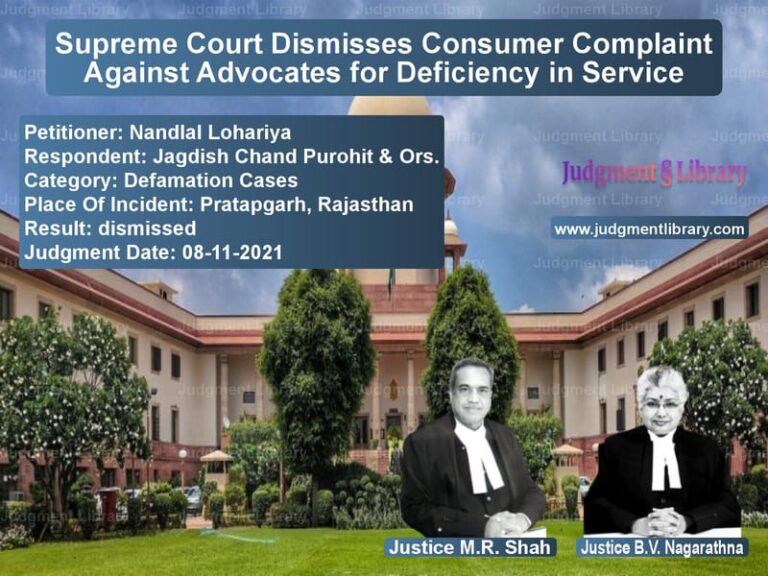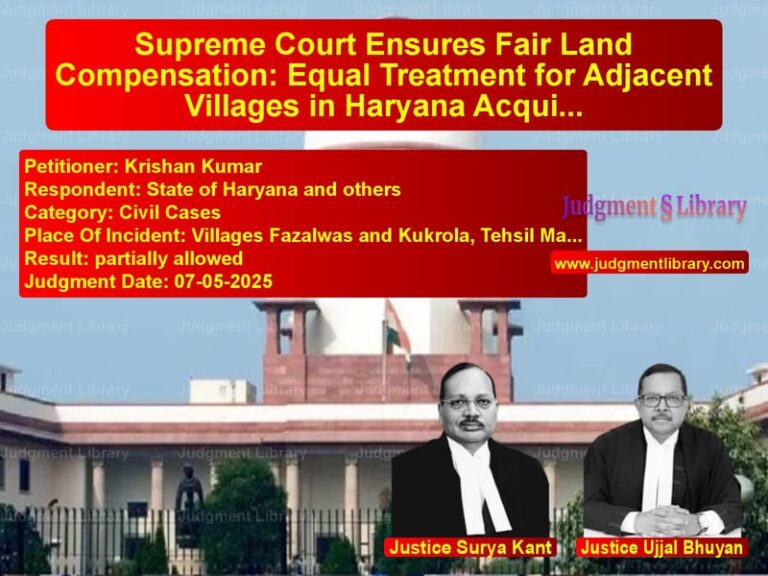Supreme Court Dismisses Specific Performance Suit: Plaintiff Failed to Prove Readiness and Willingness
In a significant ruling, the Supreme Court of India in Ravi Setia v. Madan Lal & Ors. dismissed the plaintiff’s appeal for specific performance of a sale agreement. The Court found that the plaintiff had failed to demonstrate his continuous readiness and willingness to perform his contractual obligations, a mandatory requirement under Section 16(c) of the Specific Relief Act, 1963.
Background of the Case
The case involved an agreement for sale dated 10.11.1989 concerning 2/3rd of land owned by defendants 1 and 2. Defendant 3 had declined to sign the agreement. The plaintiff paid an earnest money deposit of Rs. 50,000, with the balance of Rs. 3,10,490 to be paid at the time of execution.
The plaintiff claimed that he was present at the Sub-Registrar’s office on 30.04.1990, the agreed date for execution, but the defendants failed to appear. However, during the litigation, the defendants sold the land to third parties through sale deeds dated 16.01.1991.
Both the Trial Court and the First Appellate Court ruled in favor of the plaintiff, granting specific performance of the contract. However, the High Court, in second appeal, reversed these findings, stating that the plaintiff had failed to prove readiness and willingness to perform his part of the contract.
Arguments by the Petitioner (Plaintiff)
The petitioner’s counsel, Shri Amit Anand Tiwari, argued:
- The High Court improperly interfered with the concurrent findings of the lower courts, which had ruled in favor of the plaintiff.
- The plaintiff was always ready and willing to perform his obligations under the contract.
- The defendants were absent on the scheduled date of execution (30.04.1990), despite the plaintiff’s presence at the Sub-Registrar’s office.
- The subsequent sale to third parties was a sham and should not have affected the plaintiff’s rights.
- As an alternative remedy, if specific performance was denied, the defendants should be ordered to compensate the plaintiff by refunding the earnest money along with damages.
Arguments by the Respondents (Defendants)
The respondents’ counsel, Shri Ranjit Thomas, countered with the following points:
- The plaintiff failed to prove his financial readiness to pay the remaining balance of Rs. 3,10,490.
- The defendants had sent two registered notices (dated 28.05.1990 and 12.06.1990) asking the plaintiff to complete the sale by 25.06.1990, but he did not respond.
- The plaintiff did not deposit the balance amount within the two-month period granted by the Trial Court in its decree on 01.06.1994.
- The plaintiff only applied for an extension after the deadline had expired, showing his inability to perform the contract.
- The High Court was justified in reversing the concurrent findings since the lower courts failed to consider key evidence.
Supreme Court’s Observations
A bench comprising Justices Navin Sinha and Indira Banerjee analyzed the evidence and ruled in favor of the respondents. The Court made the following key observations:
- The plaintiff failed to establish his continuous readiness and willingness to perform his obligations, a fundamental requirement under Section 16(c) of the Specific Relief Act.
- The certificate from the Sub-Registrar’s office indicating the plaintiff’s presence on 30.04.1990 was not sufficient proof of readiness and willingness.
- The plaintiff did not respond to the registered notices sent by the defendants, which demonstrated a lack of interest in completing the transaction.
- His application for an extension of time to deposit the balance amount was made only after the court-granted deadline had expired.
- The mere pendency of an appeal by the defendants did not prevent the plaintiff from depositing the money in court.
The Court stated:
“The grant of specific performance is a discretionary and equitable relief. The plaintiff must demonstrate continued readiness and willingness, which is missing in this case.”
Final Judgment
The Supreme Court issued the following rulings:
- The plaintiff’s appeal was dismissed.
- The plaintiff was not entitled to specific performance as he failed to fulfill his obligations.
- The defendants were directed to refund the earnest money (Rs. 50,000) to the plaintiff within one month, failing which interest at 7% per annum would apply.
Analysis of Readiness and Willingness under Specific Relief Act
The judgment reaffirmed key legal principles regarding specific performance:
- The plaintiff must show continuous financial capability and intent to fulfill the contract.
- Failure to deposit the balance amount within the stipulated time is strong evidence against readiness and willingness.
- Trial courts must critically examine whether the plaintiff has met all legal requirements before granting specific performance.
The Court referred to past precedents, including:
- V.S. Palanichamy Chettiar Firm v. C. Alagappan: Holding that mere filing of a suit within limitation is insufficient; the plaintiff must prove readiness and willingness.
- Umabai v. Nilkanth Dhondiba Chavan: Emphasizing that the plaintiff’s conduct throughout the transaction must reflect genuine commitment to performing the contract.
Impact of the Judgment
This ruling serves as a crucial precedent for specific performance suits. It highlights that courts will not automatically enforce sale agreements if the plaintiff:
- Fails to take timely steps to complete the transaction.
- Does not deposit the balance consideration within the required timeframe.
- Relies on procedural technicalities rather than demonstrating real willingness to execute the contract.
Conclusion
The Supreme Court’s ruling in Ravi Setia v. Madan Lal reinforces the principle that specific performance is an equitable relief granted only to those who diligently fulfill their contractual obligations. The case serves as a reminder for buyers in real estate transactions to ensure timely compliance with contractual terms, as failure to do so may lead to forfeiture of rights.
Petitioner Name: Ravi Setia.Respondent Name: Madan Lal & Ors..Judgment By: Justice Navin Sinha, Justice Indira Banerjee.Place Of Incident: Village Gumjal, Tehsil Abohar, District Ferozpur.Judgment Date: 04-10-2019.
Don’t miss out on the full details! Download the complete judgment in PDF format below and gain valuable insights instantly!
Download Judgment: Ravi Setia vs Madan Lal & Ors. Supreme Court of India Judgment Dated 04-10-2019.pdf
Direct Downlaod Judgment: Direct downlaod this Judgment
See all petitions in Contract Disputes
See all petitions in Property Disputes
See all petitions in Specific Performance
See all petitions in Judgment by Navin Sinha
See all petitions in Judgment by Indira Banerjee
See all petitions in dismissed
See all petitions in Refund Ordered
See all petitions in supreme court of India judgments October 2019
See all petitions in 2019 judgments
See all posts in Civil Cases Category
See all allowed petitions in Civil Cases Category
See all Dismissed petitions in Civil Cases Category
See all partially allowed petitions in Civil Cases Category

